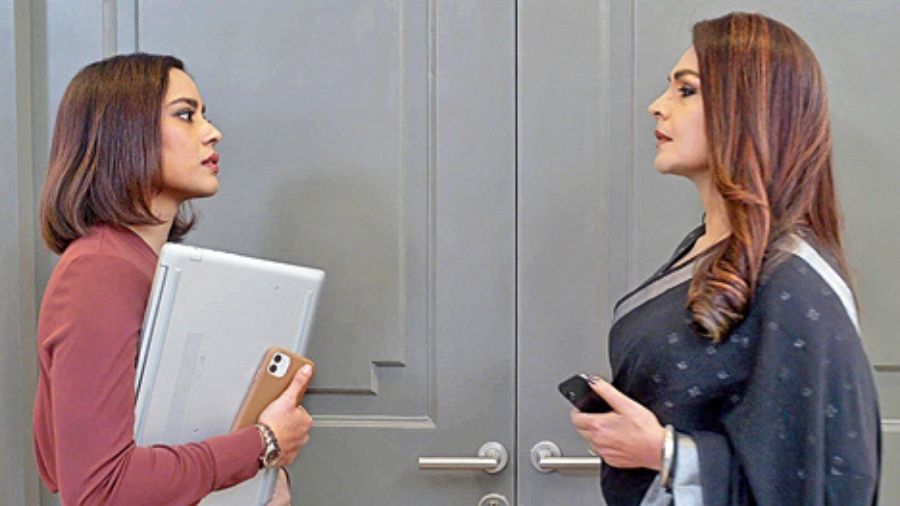The unspooling of a woman’s thoughts — her needs, her hopes, her dreams — is what almost every piece of writing, book to film, short to series, that aims to explore what a woman wants, has fashioned into a template. There is vulnerability but there is also strength, there is ambition but there is also the pressure to pull back. A woman’s mind, the working of her inner world, continues to provide fodder for writers and film-makers across the globe, even as she battles the world, striving to find her own little corner in it.
Bombay Begums explores a woman’s mind and her battle both for and against it. But it also examines her relationship with her body, both for and against it. Each of the five women in this six-part Netflix series has a love-hate relationship with her body, sometimes using it, often berating it, and eventually accepting it.
A corporate honcho, a year short of 50, is distracted by hot flushes in her male-dominated business meetings, but Rani Singh Irani (Pooja Bhatt) refuses to accept that she’s inching towards menopause because that, as women are often made to believe, is the death knell for desirability. Her 30-something colleague at the bank — a bright, ambitious woman who has climbed the corporate ladder far swiftly than her husband — is made to feel inadequate because Fatima Warsi’s (Shahana Goswami) body “betrays” her every time she conceives, her womb unable to support a child. So wounded is Fatima by these standards of what makes a woman “complete” that when her husband (played by Vivek Gomber) insists they jointly screen a surrogate mother they have opted for, she dismisses it as “just a womb”.
Lower down in this female-dominated corporate set-up is the wide-eyed small-towner looking to further her career in the big city, but Ayesha Agarwal (Plabita Borthakur) first has to contend with the fact that her body responds with equal sexual excitement to both men and women. Then there is the woman who literally uses her body to sleep around in a city that never sleeps, but Lily (Amruta Subhash), an out-of-work bar dancer who now moonlights as a sex worker knows that’s the only way, for now, by which she can support her teenaged son. Bringing up the rear is the 13-year-old who is constantly aware of her precocious female classmates attracting the attention of the boys, and so Shai Irani (Aadhya Anand) believes that the only way she can gain acceptance among her peers is by taking the push-up bra route. That’s when she’s not doodling alone on her notepad and functioning as the narrator of the series.
Alankrita Shrivastava, the creator-director of Bombay Begums, understands women well. Lipstick Under My Burkha proved it well enough and so did her recent Dolly Kitty Aur Woh Chamakte Sitare. Like in her previous work, Alankrita explores flawed women — in body and mind. The women in this world are fighting the men for sure, but they are also waging war against one another. They are victims of prejudice and judgment, but are also guilty of perpetuating it. They sometimes champion each other, but even if they lend a hand to help, like when Rani bankrolls Lily’s factory, it’s not because she wants to, but because she’s been blackmailed into it.
They aren’t guilty when they look for sexual gratification outside their marriage, but that doesn’t mean they don’t accept the fact that their moral compass is skewed. More often than not, through its almost six-hour run-time, Alankrita affords a fascinating look into the lives of these women who are constantly fighting off being reduced to a tick on a box.
The problem with Bombay Begums, however, lies in the fact that its treatment is often too Bollywood. Alankrita’s decision to use the voice of a teenager to explore and examine the moods and motivations of the rest of the women may have sounded like a winner on paper, but Aadhya Anand’s listless and expository voiceover is a no-no from the get-go. The show attempts to explore a number of themes that modern women have to contend with, both at home and outside, but the tonality of Bombay Begums is too on your nose. A little bit of subtlety and nuance (you cringe at a teenaged boy telling a classmate who’s just started menstruating, “I can smell you’re growing up”. Er, what?!) would have been welcome.
The performances largely help to tide over the hiccups. Shahana is, as usual, solid as Fatima, while Amruta, cast against type, excels. Plabita has to contend with an under-written part, but makes it count, while the men — Vivek Gomber, Danish Hussain, Rahul Bose and Manish Choudhary — fit their parts well.
It’s Pooja Bhatt — in a power-packed return to the screen after that apology of a framed photograph and faint voiceover in Sadak 2 — who makes Bombay Begums almost always interesting. It’s refreshing to see an actress play her age, and while not a strand of hair escapes from Rani’s perfectly coiffured bun in the boardroom, she isn’t afraid to let her dark circles show in the bedroom. Real women are at last showing up on our screens. That is reason enough to celebrate.
I liked/ didn’t like Bombay Begums because... Tell t2@abp.in











